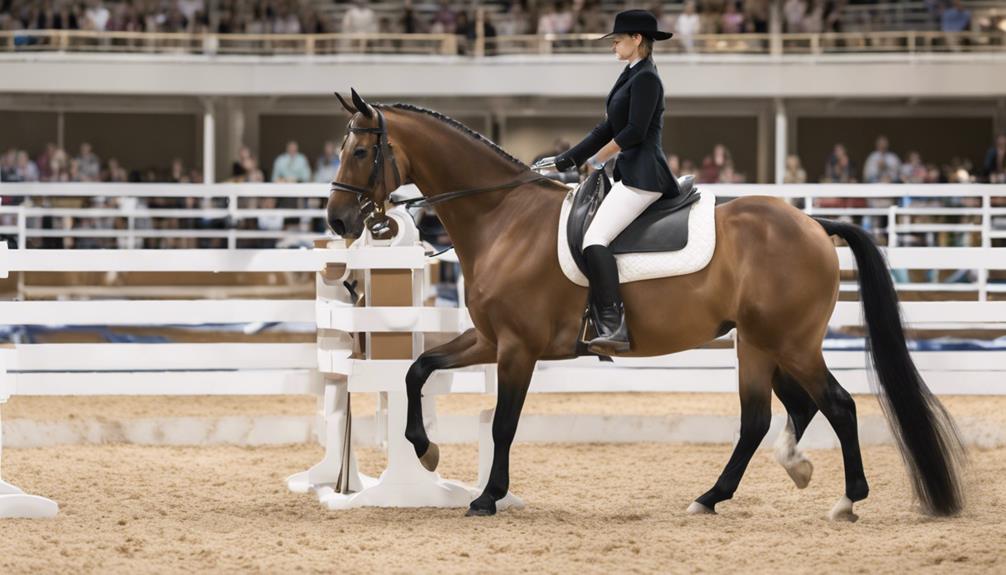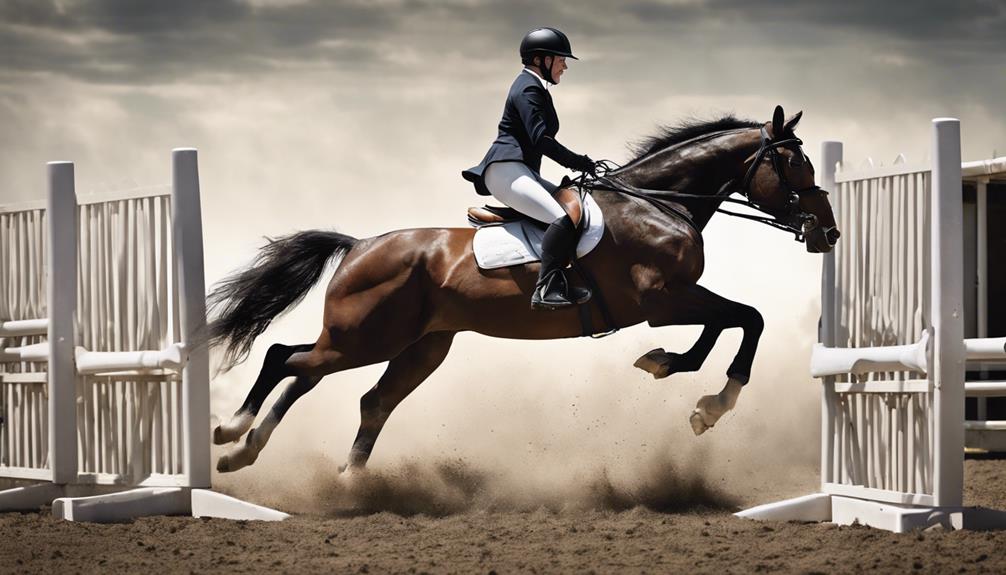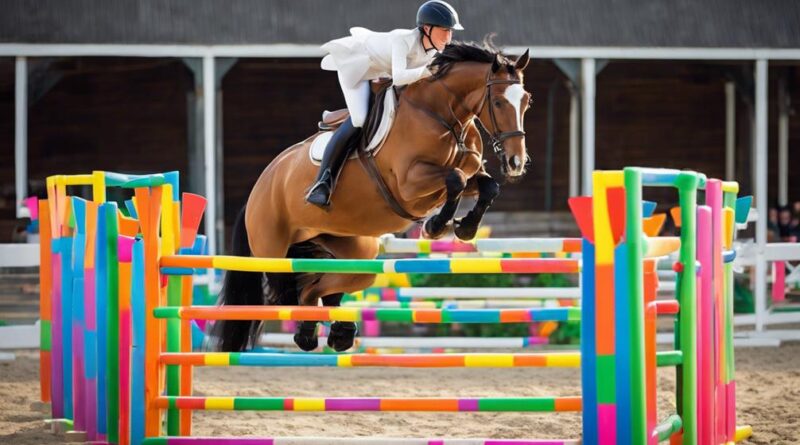Mastering Equestrian Competition: Essential Training Guide
As you adjust your riding helmet and tighten the girth of your saddle, you're about to embark on a journey towards mastering equestrian competitions.
From refining your jumping techniques to honing your dressage skills, every aspect of your training plays a crucial role in your success.
But there's one key element that can truly elevate your performance to the next level, a secret weapon that experienced equestrians swear by.
Stay tuned to uncover this essential training guide that will set you apart from the competition and lead you towards victory in the arena.
Building Rider-Horse Connection
To strengthen your bond with your horse, focus on developing clear communication and mutual trust through consistent practice and positive reinforcement. Communication cues play a vital role in establishing a strong connection with your horse. Pay attention to your body language, voice commands, and subtle signals to convey your intentions effectively. Consistency is key in using these cues so that your horse learns to understand and respond appropriately to your cues.
Trust building is a fundamental aspect of the rider-horse relationship. Your horse must feel secure and confident in your presence. Spend quality time with your horse outside of training sessions to build a sense of companionship and trust. Engage in activities that your horse enjoys, such as grooming, hand-grazing, or simply spending quiet moments together. By creating positive associations and experiences, you strengthen the foundation of trust between you and your horse.
Incorporate positive reinforcement techniques to reinforce good behavior and strengthen your bond. Reward your horse with treats, praise, or a gentle pat when they respond correctly to your cues. This encourages your horse to repeat the desired behavior and fosters a positive learning environment. Remember to be patient and consistent in your training approach to build a solid foundation of trust and communication with your horse.
Perfecting Jumping Techniques
Strengthen your jumping techniques by focusing on proper form and timing to navigate obstacles effectively and enhance your performance in equestrian competitions. Jumping precision is crucial in mastering the art of jumping. To achieve this, ensure you maintain a balanced position with your heels down, eyes up, and a straight back as you approach the jump. Timing techniques play a significant role in executing successful jumps. Practice adjusting your horse's stride to meet the take-off point accurately. Develop a sense of rhythm with your horse to anticipate the moment to jump.
When approaching a jump, remember to keep a consistent pace and approach angle. Avoid rushing or hesitating, as this can affect your horse's confidence and ability to clear the obstacle cleanly. Focus on establishing a connection with your horse, communicating effectively through subtle cues to guide them over the jump. Practice different types of jumps to improve your versatility and adaptability in various competition settings.
Utilize gridwork exercises to refine your jumping techniques and improve your horse's agility. These exercises help enhance your horse's adjustability and responsiveness to your aids, leading to smoother and more precise jumps. By honing your jumping skills with dedication and practice, you can elevate your performance in equestrian competitions and showcase your mastery of jumping techniques.
Developing Dressage Skills
Enhance your equestrian prowess by refining your dressage skills through focused practice and attention to detail. Dressage, often referred to as the art of horse training, emphasizes the harmony between horse and rider. To excel in dressage, mastering precision movements and executing graceful transitions are paramount.
Precision movements are the cornerstone of dressage. Practice essential exercises such as circles, serpentines, and halts to enhance your horse's responsiveness to subtle cues. Focus on achieving straightness and correct bend in each movement, as this forms the basis for more advanced maneuvers. By consistently practicing precision movements, you'll develop a deeper connection with your horse and improve your overall performance in the dressage arena.
In addition to precision movements, mastering graceful transitions is essential for a successful dressage routine. Smooth transitions between gaits, such as walk to trot or trot to canter, showcase your horse's suppleness and obedience. Practice these transitions with light aids and ensure your horse maintains a steady rhythm throughout. By refining your transitions, you'll elevate the fluidity and elegance of your dressage performance.
Enhancing Cross-Country Performance
Improve your cross-country riding skills by focusing on mastering efficient and strategic techniques. To enhance your performance in cross-country competitions, consider the following key areas:
- Endurance Training: Building your endurance is crucial for tackling long cross-country courses efficiently. Incorporate regular cardio workouts and interval training into your routine to increase stamina and resilience. Endurance training not only benefits your physical fitness but also helps you maintain focus throughout the course, ensuring you can navigate obstacles effectively.
- Obstacle Navigation: Practice navigating a variety of obstacles to hone your skills and build confidence. Work on technical elements such as water jumps, ditches, and combinations to become adept at tackling different challenges. By familiarizing yourself with various obstacles, you can develop a strategic approach for each, improving your overall performance on the course.
- Terrain Adaptation and Pacing Techniques: Learn to adapt your riding style to different terrains to optimize your performance. Understanding how to adjust your pace and riding technique based on the ground conditions can help you maintain momentum and control. Implement pacing techniques such as establishing a rhythm, adjusting stride lengths, and conserving energy strategically to tackle the course effectively.
Mastering Show Ring Etiquette

To excel in equestrian competitions, mastering show ring etiquette is essential for showcasing your skills and professionalism in the arena. Your ring presence plays a crucial role in leaving a lasting impression on the judges and spectators. When entering the ring, ensure you're dressed in proper attire that adheres to the competition rules. Your outfit should be clean, well-fitted, and appropriate for your specific discipline.
In addition to your attire, remember to always display polite gestures and sportsmanship towards your fellow competitors. Greeting others with a smile and a friendly nod can go a long way in creating a positive atmosphere in the show ring. During the competition, be mindful of your actions and how they may impact those around you. Avoid any behaviors that could be perceived as unsportsmanlike or disrespectful.
Maintaining a high level of professionalism and respect for others not only reflects positively on you as a rider but also contributes to a harmonious and enjoyable competition environment for everyone involved. By mastering show ring etiquette, you demonstrate your dedication to the sport and your commitment to upholding its values of fairness and camaraderie.
Understanding Course Strategy
Navigating an equestrian course successfully requires strategic planning and quick decision-making to achieve optimal performance. To excel in competition, understanding course strategy is essential. Here are some key points to consider:
- Course navigation, strategic approach: Before entering the course, take the time to study the layout. Identify key points where you can make up time or take advantage of your horse's strengths. Plan your route according to your horse's stride length and adjust your approach based on the course's complexity. Visualize your ride, anticipating each turn and jump to maintain a smooth flow.
- Analyzing obstacles, tactical adjustments: As you ride, continuously analyze the obstacles ahead. Assess the distances between jumps, the angles of approach, and the footing conditions. Be ready to make split-second tactical adjustments based on your horse's response and the course requirements. Stay focused and adaptable, ready to alter your plan if needed to optimize your performance.
- Maintaining composure, consistency: Stay calm and composed throughout the course. Keep your aids clear and precise, guiding your horse confidently through each element. Consistency in your pace and rhythm will help you navigate the course smoothly. Trust your training and your horse, maintaining a positive mindset to tackle challenges effectively.
Improving Speed and Agility

Enhance your equestrian performance by focusing on increasing speed and agility during competitions. Speed and agility are crucial elements in equestrian sports that can make a significant difference in your overall performance. To improve your speed, incorporate speed drills into your training regimen. These drills can help enhance your horse's responsiveness to your cues and increase your overall pace around the course.
Agility exercises are also essential for mastering equestrian competitions. Incorporate exercises that focus on quick turns, precise movements, and tight transitions to navigate courses more efficiently. Practicing these agility exercises will help you and your horse maneuver through obstacles with ease and grace.
When working on speed drills, focus on exercises that require bursts of acceleration and maintaining a consistent pace over distances. Incorporate interval training to improve your horse's stamina and ability to sustain speed throughout the competition. Additionally, practicing agility exercises such as serpentines, figure eights, and transitions between different gaits can help improve your horse's flexibility and responsiveness to your aids.
Mental Preparation for Competitions
Prepare your mind for competitions by focusing on mental strength and resilience. Mental preparation is crucial for success in equestrian competitions.
Here are some key strategies to help you get mentally ready for the challenges ahead:
- Visualization: Before the competition, spend time visualizing yourself performing at your best. Picture yourself and your horse executing flawless jumps, turns, and maneuvers. Visualize the course, imagine the feel of the reins in your hands, and the rhythm of your horse's movements. This mental rehearsal can help boost your confidence and prepare you for the actual ride.
- Relaxation Techniques: Incorporate relaxation techniques into your pre-competition routine. Deep breathing exercises, progressive muscle relaxation, or mindfulness meditation can help calm your nerves and focus your mind. By staying relaxed and centered, you can perform better under pressure and make quick decisions during the competition.
- Positive Self-Talk: Monitor your inner dialogue and replace negative thoughts with positive affirmations. Encourage yourself, remind yourself of your strengths, and stay optimistic. Positive self-talk can help you stay motivated, resilient, and in the right mindset to tackle any challenges that come your way during the competition.
Frequently Asked Questions
What Are Some Common Mistakes Riders Make During Competitions That Can Hinder Their Performance?
When competing, riders often make mistakes that can hurt their performance. Lack of mental preparation and visualization can lead to errors. It's crucial to fine-tune your rider mindset and focus techniques.
Stay in the moment and visualize success to boost your performance. Avoid distractions and maintain a positive attitude. By honing these skills, you can enhance your competitive edge and achieve better results in equestrian competitions.
How Can Riders Effectively Manage Nerves and Anxiety Before a Competition?
To manage nerves and anxiety before a competition, focus on breathing techniques and visualization exercises. Take deep breaths to calm your mind and body. Imagine yourself performing well and visualize a successful ride.
Are There Specific Warm-Up Exercises or Routines That Can Help Improve a Rider's Performance on Competition Day?
To enhance your performance on competition day, focus on specific warm-up exercises like pre-competition visualization and stretching. Engage in mental preparation and use focus techniques to center your mind.
Visualize success and go through your routine in your mind. Stretch to loosen up and get your body ready. By incorporating these practices, you can improve your performance and feel more confident when it's time to compete.
How Important Is the Role of Nutrition and Hydration in a Rider's Overall Performance During Competitions?
Ensuring a proper nutritional balance and maintaining optimal hydration levels are crucial for your overall performance during competitions.
Your body needs the right fuel to perform at its best, and staying properly hydrated is key to maintaining focus and stamina.
Ignoring nutrition and hydration can lead to decreased performance, so make sure to pay attention to these aspects to give yourself the best chance of success in equestrian competitions.
What Are Some Tips for Maintaining and Caring for a Horse's Physical and Mental Well-Being During the Competition Season?
To ensure your horse's peak performance during the competition season, focus on their mental preparation and physical conditioning.
Prioritize a consistent training regimen to maintain their fitness levels. Incorporate activities that stimulate their mind and prevent burnout.
Pay attention to their nutrition and hydration needs to support their overall well-being. Regularly assess their health and adjust their care routine as needed to keep them in top shape for competitions.
Conclusion
Congratulations on completing this essential training guide for mastering equestrian competition!
By focusing on building a strong connection with your horse, perfecting your jumping techniques, developing dressage skills, enhancing cross-country performance, mastering show ring etiquette, understanding course strategy, improving speed and agility, and mentally preparing for competitions, you're well on your way to becoming a successful equestrian competitor.
Keep practicing, stay dedicated, and never stop striving for excellence in the arena.
Good luck in your future competitions!
